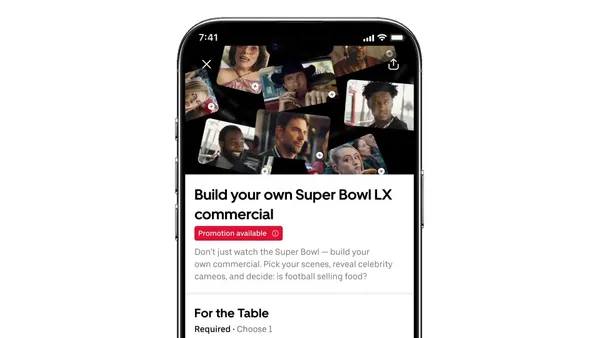Brief:
- Fandango partnered with Google to let consumers buy movie tickets with voice commands using Google Assistant, per a statement. Moviegoers can order tickets for more than 30,000 screens nationwide using the Fandango Action, without needing to download Fandango's separate mobile app.
- The voice command "Okay Google, let's buy movie tickets" activates the service on Google Home smart speakers or a Google Assistant-enabled smartphone. Users can then click a link on their smartphone to purchase the tickets.
- The feature debuted on May 4, also known as "Star Wars Day" for the pun "May the fourth be with you," with advance ticket sales for "Solo: A Star Wars Story" that premieres on May 25.
Insight:
Fandango and Google's latest partnership marks another step in the ticketing service's growth on voice-enabled platforms after making a transition to mobile commerce over the past few years. Not only has Fandango added more theater chains to its platform, but it's also integrated the latest technology into its mobile marketing mix, including artificial intelligence-powered chatbots, voice recognition, social media and in-messaging app ticket purchasing. Facebook Messenger last year updated its M digital assistant with a chat extension that shows theater times from Fandango in conversations mentioning movies. Fandango in January added Google Pay as a digital payment option for movie ticket purchases on its online, mobile and social platforms, signaling the ticketing service's push toward adding convenient options for movie fans.
Google is gaining ground on tech rival Amazon, the current market leader in voice-enabled devices. Google Home is forecast to grow its share of the smart speaker market to 32.9% by 2020 from 29.5% this year, while Amazon's share will decrease to 60.8% from 66.6% during the three-year period. EMarketer estimates 40.7 million people in the U.S. will use an Amazon Echo at least once a month this year, while No. 2 Google Home will have 18 million users. Because some households may use more than one voice-enabled device, there could be some overlap in those figures.
While tech giants vie for consumer acceptance, the overall smart speaker market has plenty of room for growth as software developers extend the range of functions for the devices. More Americans will use a voice-enabled speaker than will use a wearable device this year, eMarketer forecast.
The most popular consumer activity for smart speakers is listening to music, podcasts and digital radio. The second-most popular smart speaker activity is asking questions. Fewer people use their devices for shopping, comparing prices, controlling their other smart-home devices and buying items. Fandango's latest feature points to the growing number of practical use cases for voice-powered devices.












